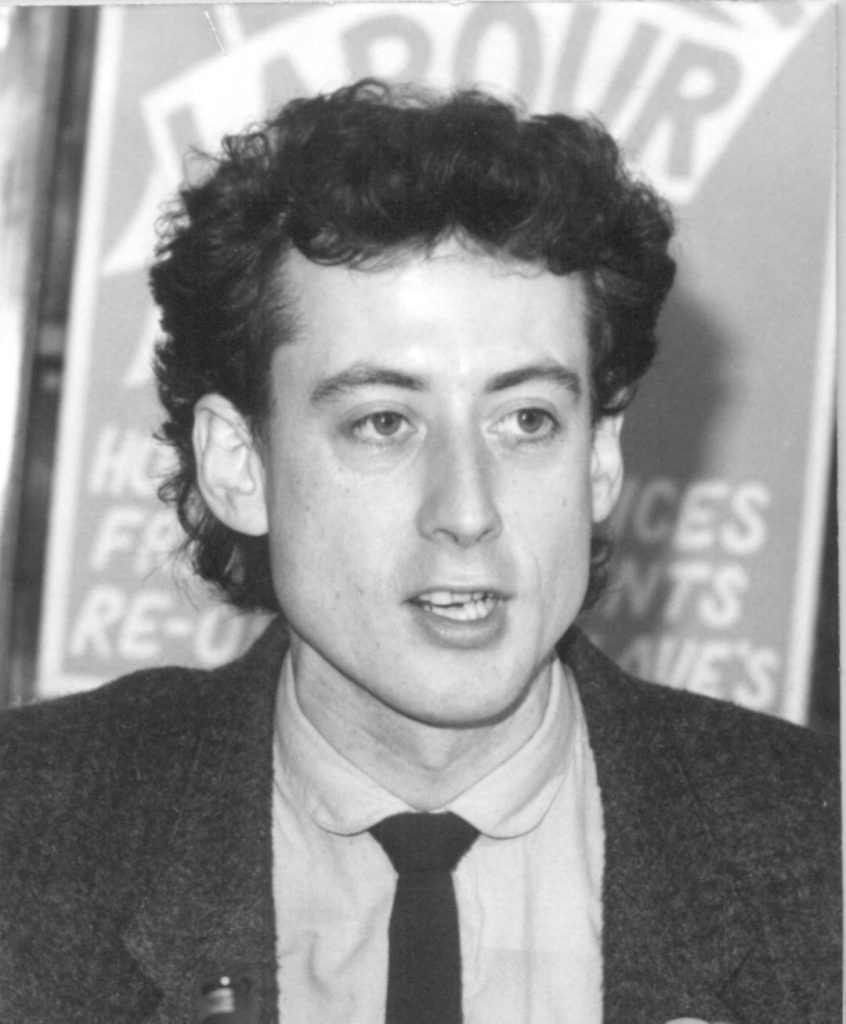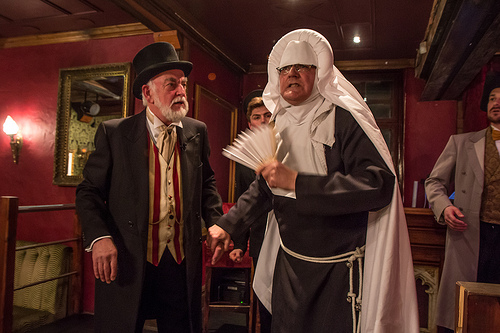Stephen M Hornby, award winning Manchester playwright and Playwright in Residence at People’s History Museum (PHM), blogs about writing his new play for us. It’s about seasoned human rights campaigner Peter Tatchell’s time as a Labour Party candidate in the hugely controversial 1983 Bermondsey by-election.
Stephen will give an insight into writing his new play and his process of using PHM’s archives in a series of three blogs.
‘I’m suddenly really nervous. It’s one thing meeting someone at a public do, shaking hands, having a selfie moment and moving on. But this is an interview. A three hour interview, which is itself one of three interviews. In his flat. His home. What if he doesn’t like me? What if I don’t like him? What if my questions are really bad, predictable and shallow? I can see the block where his flat is. I’m early. Too early to knock. That might come across as passive aggressive, as if I’m trying to catch him out in some way. It’s raining. Time for a coffee and some deep breaths.
I have met Peter Tatchell before, several times, going back to the 1980s. I was a drama student at the University of Kent from 1987. A wonderful out gay drama lecturer, Alan Beck, was orchestrating Tatchell, Ian McKellen and Derek Jarman to protest against the introduction of what was to become Section 28 of the Local Government Act 1988 (this prohibited local authorities from intentionally promoting homosexuality and from publishing material in any maintained school on the acceptability of homosexuality as a “pretended” family relationship). I’d only just come out. Bad timing. Alan gathered gay men under his wing and gently but decisively politicised us. And then I’m stood in his garden handing out burgers to men in black leather jackets, one of them was Peter Tatchell. It was our first fleeting connection.

Manchester, February 1988 and I’m on a train from London packed with a huge number of gays and lesbians, all impossibly, joyously out, and angry. The mood is one of defiance. We’re ready to be welcomed by a wonderful city, but bristling with defiance to the anticipated rough treatment by the notoriously homophobic Greater Manchester Police. Peter is at the head of the march. I catch his eye at one point and smile. I wonder if I should go over and say hello, presume that he remembers me from the BBQ months earlier, the nervous drama student who handed him a slightly charred bap. Perhaps. Perhaps not. My diffidence means the moment evaporates and Peter is swept on.
During the 1990s, I followed his activism on telly. I have a job now. A proper job as a Probation Officer. My activism is more individualised. I don’t do protests much anymore. Peter does. He founds gay rights group OutRage! and disrupts the Easter sermon by the then Archbishop of Canterbury Lord Carey. He gets arrested. He tries to arrest Robert Mugabe. He gets badly beaten. He becomes a remote televisual figure and my life drifts back into theatre. I become a playwright, a proper one, and that leads me somehow to becoming the first LGBT History Month Playwright in Residence. My own little part of the past to play with.
It’s 2015. LGBT History Month is holding its first ever history festival. I now live in Manchester, where the festival is being held. We’re staging a three part theatre piece, A Very Victorian Scandal, about the largest ever police raid on a LGBT venue in Hulme, Manchester in 1880. We’re doing it in Via, a vibrant pub on Manchester’s Canal Street, in the city’s Gay Village. There’s actors in period costumes, musicians, can-can boys, an international audience. We sort of have permission to re-stage the raid in police uniforms….sort of.

And suddenly I’m asked to meet a Mr Tatchell at the door and escort him into a reserved area. There he is. I recognise him, of course. He doesn’t recognise me. Why would he? And I whisk him through the crowd to meet Sister Mercy, a man dragged up as a nun who is part of the performance. That man is Alan Beck, and for a brief second we are all in the same moment again, as we were in 1988, all the same, all completely different.
It’s time now. I get out of the cafe and back into the rain. It’s time to meet Peter. For the fourth time, but also for the first. I walk up some stairs on the side of the building and knock on the door.’
Stephen’s work began with a detailed study of the Labour Party archives, the complete holdings of which are held at PHM, where the museum also holds some of the personal papers of Tatchell. The project is supported by the Arts and Humanities Research Council (AHRC) and the University of Salford.
Stephen’s play, First Rumours, will premiere as a rehearsed reading at People’s History Museum on Sunday 10 February 2019 at 3.00pm as part of OUTing the Past, the national festival for LGBT history and the museum’s 2019 programme, which is dedicated to exploring the past, present and future of protest. The reading will be followed by a Q&A with Peter Tatchell, facilitated by LGBT activist and historian Paul Fairweather.
You can find out more about Stephen’s work here:
Guest blogs are not curated by PHM but feature voices on topics relevant to the museum’s collection. Guest blogs do not necessarily reflect the views of PHM. Photographs supplied by contributor.